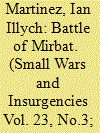|
|
|
Sort Order |
|
|
|
Items / Page
|
|
|
|
|
|
|
| Srl | Item |
| 1 |
ID:
113214


|
|
|
|
|
| Publication |
2012.
|
| Summary/Abstract |
On 19 July 1972, the pivotal battle of the Dhofar rebellion occurred when over 250 communist guerillas, called adoos,1
attacked the coastal garrison town of Mirbat2 where nine men of the British 22nd Special Air Service Regiment were stationed. Their decisive defense of Mirbat led to decorations three years after the battle, the beginning of the end of the rebellion, and calls for the awarding of Britain's highest honor, the Victoria Cross. The Battle of Mirbat, let alone the Dhofar rebellion are little known outside the UK due3 to the covert nature of the SAS deployment, the then Labour government's obsession with secrecy, and the remoteness of the area of operations. Nonetheless, of all the proxy wars of the Cold War this one had the most significance, because had the communist adoos won, Oman and its Musandam Peninsula, which sticks out like a dagger into the Straits of Hormuz and abuts the United Arab Emirates, would have fallen into the communist orbit; threatening the West's oil supply. This is the story of the pivotal battle that was won by Britain and Oman against a communist insurgency.
|
|
|
|
|
|
|
|
|
|
|
|
|
|
|
|
| 2 |
ID:
101333


|
|
|
|
|
| Publication |
2010.
|
| Summary/Abstract |
To many scholars and policymakers, 'partition' offers the most efficacious means of resolving ethnic-civil wars. Others reject partition as a solution, citing flaws (both logical and empirical) and harmful international implications should such an approach become commonplace. What has been missing from this debate is an understanding of how the process of partition unfolds. In this article we examine such a process, the case of the Krajina in the war in Yugoslavia, 1994-1995. The US aligned itself with Croatia against Serbs rebelling in the Krajina region of Croatia. The culmination of this alignment occurred in August 1995 when Croatian forces initiated 'Operation Storm' (Oluja) against Croatian Serb insurgents. Croatian forces effectively cleansed the Krajina of its Serbian population. Eager to initiate a diplomatic peace process, Washington welcomed the Croatian operation, and largely because of Operation Storm, negotiations at Dayton became possible.
|
|
|
|
|
|
|
|
|
|
|
|
|
|
|
|
|
|
|
|
|